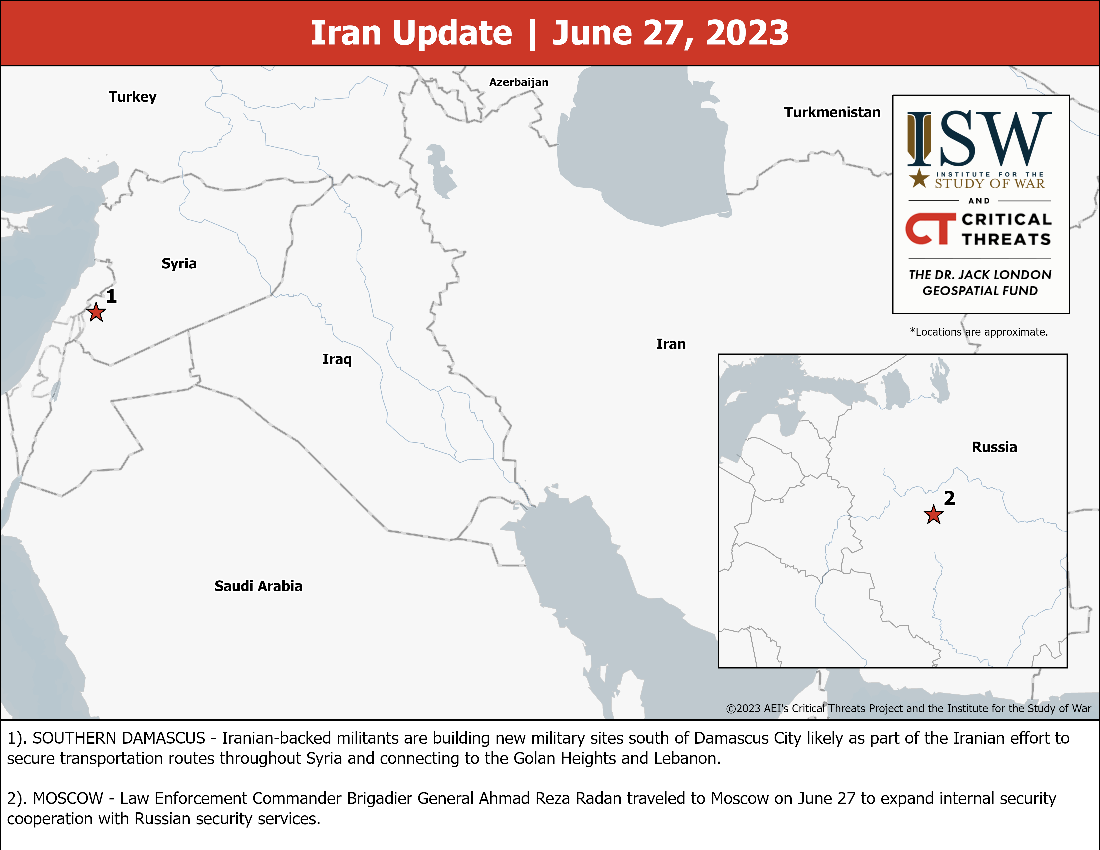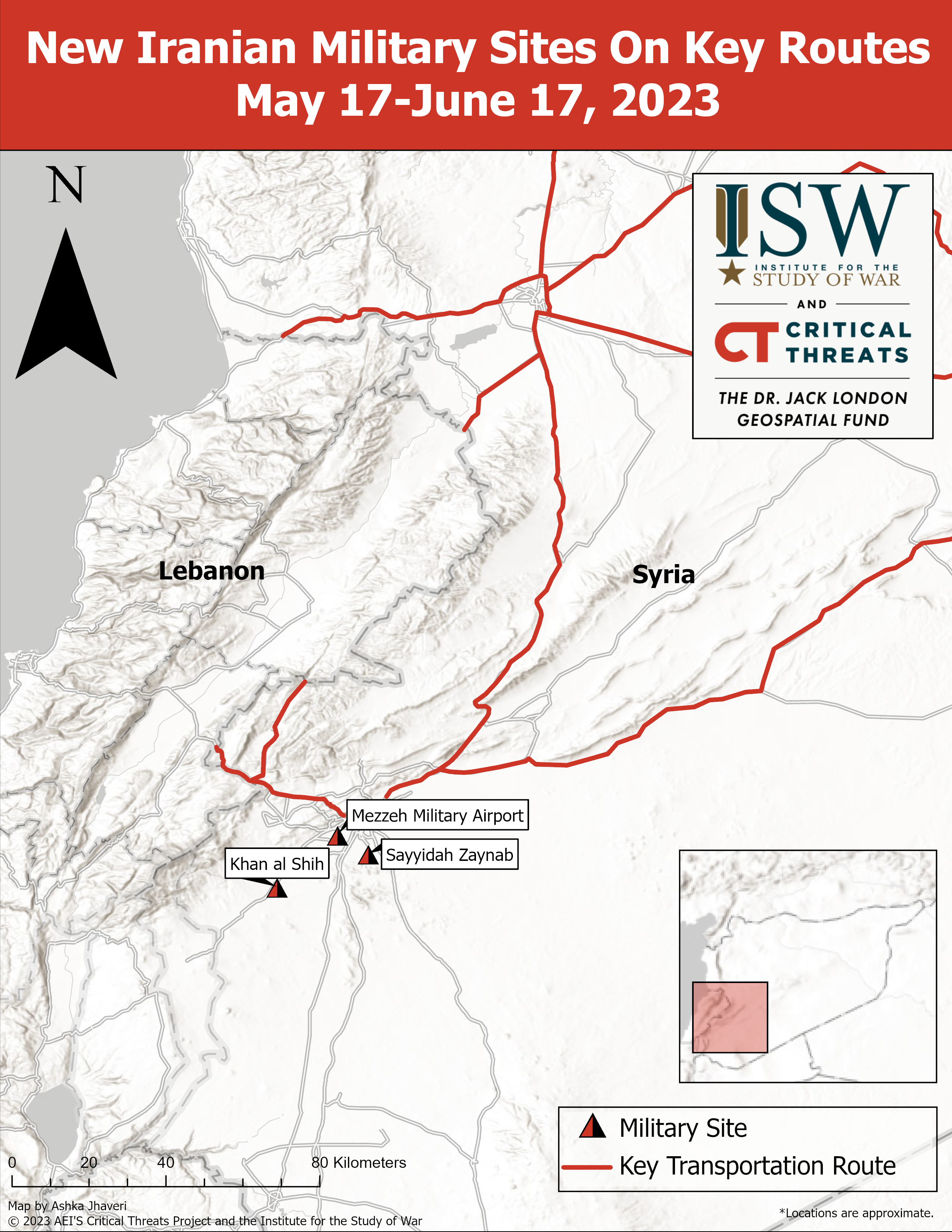 |
 |
Iran Update, June 27, 2023

Iran Update, June 27, 2023
Andie Parry, Amin Soltani, and Nicholas Carl
The Iran Update aims to inform national security policy by providing timely, relevant, and independent open-source analysis of developments pertaining to Iran and its Axis of Resistance. This update covers political, military, and economic events and trends that affect the stability and decision-making of the Iranian regime. It also provides insights into Iranian and Iranian-sponsored activities abroad that undermine regional stability and threaten US forces and interests. The Critical Threats Project (CTP) at the American Enterprise Institute with support from the Institute for the Study of War (ISW) provides these updates Monday through Friday. To receive Iran Updates via email, please subscribe here.
The Institute for the Study of War (ISW) with support from the Critical Threats Project (CTP) at the American Enterprise Institute launched a new interactive map of Iran and the Middle East. The map depicts events in Iran that affect the stability of the Iranian regime, namely anti-regime protests and reported poisoning incidents. It also shows developments in Syria that jeopardize regional stability and pose threats to US forces and interests, including Iranian and Iranian-backed militia positions.
Key Takeaways
- Iranian-backed militants are building new military sites south of Damascus City likely as part of the Iranian effort to secure transportation routes throughout Syria and connecting to the Golan Heights and Lebanon.
- Law Enforcement Commander Brigadier General Ahmad Reza Radan traveled to Moscow on June 27 to expand internal security cooperation with Russian security services.
Iranian Activities in the Levant
This section covers Iranian efforts to consolidate and expand Tehran’s economic, military, and political influence throughout the Levant and especially in Syria. This section examines some of the many campaigns that Iran is pursuing to achieve this strategic objective. CTP will update and refine our assessments of these campaigns over time and in future updates.
Iranian-backed militants are building new military sites south of Damascus City likely as part of the Iranian effort to secure transportation routes throughout Syria and connecting to the Golan Heights and Lebanon. The Iranian-backed Iraqi Imam Hussein Brigades seized land to build a military headquarters and storage center in Khan al Shih in southern Damascus in mid-June.[1] Lebanese Hezbollah also seized land for a headquarters and underground storage facility about 12 miles away, near the Mezzeh Military Airport, on June 17.[2] Both locations are on key transportation routes to the Golan Heights and Lebanon, which Iran uses to build its military presence around Israel and enhance its capability to deter Israel.[3] The sites also are adjacent to two locations that Israel struck during its early 2023 air campaign that aimed to disrupt Iranian transportation networks and destroy several air defense facilities.[4] This suggests that Iran was using the sites to facilitate the transfer of military materiel to these areas around the Israeli border.
Iranian-backed militants establishing new military sites in Syria and the Damascus area is part of a larger trend. Iranian-backed militants also established a military headquarters and barracks in the vicinity of Sayyidah Zaynab in southern Damascus on May 17.[5] A leader of the Iranian-backed militia Harakat Hezbollah al Nujaba separately disclosed to Al-Araby al Jadeed on June 12 that Iraqi militias remain in southern Syria despite regional normalization between the Assad regime and Arab states.[6] This demonstrates that Iran and Iranian-backed militants have continued building military sites in Syria despite the Arab League demanding in May the end of all foreign militia activity in Syria.[7]
Iranian Domestic and Political Affairs
This section covers factors and trends affecting regime decision-making and stability. CTP will cover domestic politics, significant protest activity, and related issues here.
Law Enforcement Commander Brigadier General Ahmad Reza Radan traveled to Moscow on June 27 to expand internal security cooperation with Russian security services. Radan plans to meet with officials from Russia’s National Guard, Police Operations Management Center, and Moscow Traffic Control Center. Radan will sign cooperation agreements on combating terrorism, smuggling, narcotics, and human trafficking, according to Iranian state media. Radan also stated that the two countries will share equipment to these ends but provided no further details.[8]
Radan may seek to acquire additional Russian support to enhance Iranian domestic surveillance capabilities. Doing so would be consistent with Radan’s previously stated intent to leverage advanced technologies to promote internal security.[9] Western media reported on March 27 that Russia is already helping Iran to develop advanced digital surveillance capabilities.[10] Iranian officials have stated that their efforts to widely enforce the mandatory hijab law have failed thus far and indicated interest in adopting a more confrontational approach. Radan issued a directive to the LEC on February 6 to use advanced technologies for enhancing internal security.[11] He elaborated on the directive on April 15 in an announcement that the LEC will begin using advanced surveillance capabilities to widely enforce the mandatory hijab law and reiterated his commitment to “forcefully” confront anti-regime defiance, including unveiling, the day before his trip to Moscow.[12] President Ebrahim Raisi similarly expressed concern on June 25 that the regime's efforts to “reduce social harms” have been “insufficient.”[13]
Law enforcement cooperation between Iran and Russia would add a new dimension to the growing Russo-Iranian security partnership. The partnership has largely centered on arms sales from Russia to Iran, although this has changed since Russia invaded Ukraine in February 2022. Iran has provided drones for the Russian war effort in Ukraine and has begun building a drone manufacturing facility in Russia.[14] Iran expects advanced Russian fighter jets and air defense systems in return for its support for the Russian war effort, though these sales have not yet materialized despite Iranian media reporting.[15] The partnership also has included joint naval exercises since 2014.[16]
[1] https://www-syria-tv[dot]cdn.ampproject.org/c/s/www.syria.tv/%D9%85%D9%8A%D9%84%D9%8A%D8%B4%D9%8A%D8%A7-%D8%B9%D8%B1%D8%A7%D9%82%D9%8A%D8%A9-%D8%AA%D8%B3%D8%B7%D9%88-%D8%B9%D9%84%D9%89-%D9%85%D9%85%D8%AA%D9%84%D9%83%D8%A7%D8%AA-%D9%84%D8%A7%D8%AC%D8%A6%D9%8A%D9%86-%D9%81%D9%84%D8%B3%D8%B7%D9%8A%D9%86%D9%8A%D9%8A%D9%86-%D8%BA%D8%B1%D8%A8%D9%8A-%D8%AF%D9%85%D8%B4%D9%82?amp=1 ; https://eyeofeuphrates[dot]com/ar/news/2023/06/21/8911
[2] https://eyeofeuphrates[dot]com/ar/news/2023/06/17/8872
[3] https://www.aei.org/wp-content/uploads/2023/05/Pivot-to-Offense-How-Iran-Is-Adapting-for-Modern-Conflict-and-Warfare.pdf?x91208
[4] https://www.criticalthreats.org/analysis/iran-update-april-12-2023 ; https://damascusv[dot]com/archives/50157 ; https://www[dot]enabbaladi.net/archives/635937
[5] https://www.criticalthreats.org/analysis/iran-update-may-17-2023
[6] https://www.alaraby.co.uk/node/6642569
[7] https://www.criticalthreats.org/analysis/iran-update-may-22-2023
[8] https://www.tasnimnews dot com/en/news/2023/06/27/2917418
[9] https://www.tasnimnews dot com/fa/news/1401/11/17/2848816
[10] https://www.wsj.com/articles/russia-supplies-iran-with-cyber-weapons-as-military-cooperation-grows-b14b94cd
[11] https://www.tasnimnews dot com/fa/news/1401/11/17/2848816
[12] https://www.criticalthreats.org/analysis/iran-update-april-10-2023 ; https://www.criticalthreats.org/analysis/iran-update-june-26-2023
[15] https://english.alarabiya.net/News/middle-east/2023/03/11/Iran-says-finalized-deal-to-buy-Sukhoi-Su-35-fighter-jets-from-Russia
[16] https://iranprimer.usip.org/blog/2023/may/18/iran-russia-burgeoning-military-ties

